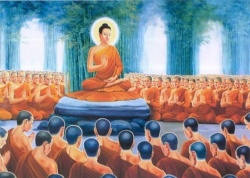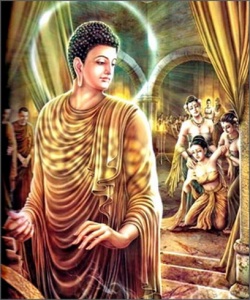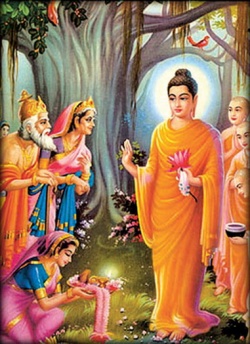Difference between revisions of "The Second Noble Truth"
| Line 5: | Line 5: | ||
'''[[The Cause of Suffering]]''' | '''[[The Cause of Suffering]]''' | ||
| − | After the [[Buddha]] learnt that [[suffering]] is a part of [[life]], he realised he could not find a way to end [[suffering]] without finding out what causes it. [[Buddhists]] study that the [[Buddha]] learnt this just like a doctor learns about what's wrong with his patient by listing their symptoms, finding out what makes them worse and studying other cases before prescribing a cure. | + | After the [[Buddha]] learnt that [[suffering]] is a part of [[life]], he realised he could not find a way to end [[suffering]] without finding out what [[causes]] it. [[Buddhists]] study that the [[Buddha]] learnt this just like a doctor learns about what's wrong with his {{Wiki|patient}} by listing their symptoms, finding out what makes them worse and studying other cases before prescribing a cure. |
| − | By watching people [[Buddha]] found out that the [[causes of suffering]] are [[craving]] and [[desire]], and [[ignorance]]. The power of these things to cause all [[suffering]] is what [[Buddhists]] call [[The Second Noble Truth]]. | + | By watching [[people]] [[Buddha]] found out that the [[causes of suffering]] are [[craving]] and [[desire]], and [[ignorance]]. The power of these things to [[cause]] all [[suffering]] is what [[Buddhists]] call [[The Second Noble Truth]]. |
'''[[Craving]]''' | '''[[Craving]]''' | ||
| − | What are things we crave for? Food we love to eat, entertainment, new things, popularity, money, beauty, holidays and so many more things and {{Wiki|experience}}, depending on who we are and where we are. [[Craving]] can be explained as the strong [[desires]] that people have for pleasing their [[senses]] and for experiencing [[life]] itself. [[Buddhists]] believe that anything that stimulates our [[senses]] or our [[feelings]] can lead to [[craving]]. | + | What are things we [[crave]] for? [[Food]] we [[love]] to eat, {{Wiki|entertainment}}, new things, [[popularity]], [[money]], [[beauty]], holidays and so many more things and {{Wiki|experience}}, depending on who we are and where we are. [[Craving]] can be explained as the strong [[desires]] that [[people]] have for [[pleasing]] their [[senses]] and for experiencing [[life]] itself. [[Buddhists]] believe that anything that stimulates our [[senses]] or our [[feelings]] can lead to [[craving]]. |
[[File:Z p11-Im.jpg|thumb|250px|]] | [[File:Z p11-Im.jpg|thumb|250px|]] | ||
| − | People everywhere crave for their favourite tastes, but we all know that not even the best sweets and our favourite meal lasts forever. Soon it is finished and there can be no more to enjoy, and then it is forgotten as though it never even happened. None of the [[pleasures]] we crave for ever give us lasting [[happiness]] or [[Wikipedia:Contentment|satisfaction]]. This is why people can [[crave]] to repeat these {{Wiki|experiences}} again and again, and become unhappy and dissatisfied until they can satisfy their craving. | + | [[People]] everywhere [[crave]] for their favourite {{Wiki|tastes}}, but we all know that not even the best sweets and our favourite meal lasts forever. Soon it is finished and there can be no more to enjoy, and then it is forgotten as though it never even happened. None of the [[pleasures]] we [[crave]] for ever give us lasting [[happiness]] or [[Wikipedia:Contentment|satisfaction]]. This is why [[people]] can [[crave]] to repeat these {{Wiki|experiences}} again and again, and become [[unhappy]] and dissatisfied until they can satisfy their [[craving]]. |
| − | The trouble is, even if these [[pleasures]] are repeated again and again, we can still feel unhappy. Imagine eating your favourite food every meal, day-after-day, week-after-week. At first you might think this is a great idea, but very soon the day will come when you just cannot enjoy that food anymore, when it might even make you feel sick! Have you ever eaten too much cake and made yourself ill? [[Buddha]] said it's the same with all the things that please the [[senses]]. | + | The trouble is, even if these [[pleasures]] are repeated again and again, we can still [[feel]] [[unhappy]]. [[Imagine]] eating your favourite [[food]] every meal, day-after-day, week-after-week. At first you might think this is a great [[idea]], but very soon the day will come when you just cannot enjoy that [[food]] anymore, when it might even make you [[feel]] sick! Have you ever eaten too much cake and made yourself ill? [[Buddha]] said it's the same with all the things that please the [[senses]]. |
'''[[Ignorance]]''' | '''[[Ignorance]]''' | ||
| − | [[Craving]] is like a great tree with many branches. There are branches of greed, bad thoughts and of anger. The fruit of the tree of [[craving]] is [[suffering]] but how does the tree of [[craving]] grow? Where can we find it? The answer, says the [[Buddha]], is that the tree of [[craving]] has its roots in [[ignorance]]. It grows out of [[ignorance]], and its seeds fall and flourish whenever they find [[ignorance]]. | + | [[Craving]] is like a great [[tree]] with many branches. There are branches of [[greed]], bad [[thoughts]] and of [[anger]]. The fruit of the [[tree]] of [[craving]] is [[suffering]] but how does the [[tree]] of [[craving]] grow? Where can we find it? The answer, says the [[Buddha]], is that the [[tree]] of [[craving]] has its [[roots]] in [[ignorance]]. It grows out of [[ignorance]], and its [[seeds]] fall and flourish whenever they find [[ignorance]]. |
[[File:Z p-47-Medin-01.jpg|thumb|250px|]] | [[File:Z p-47-Medin-01.jpg|thumb|250px|]] | ||
| − | What is [[ignorance]]? Real [[ignorance]] is not just being uneducated, or not knowing many things. [[Buddhists]] see [[ignorance]] as the inability to see the [[truth]] about things, to see things as they really are. This ability to see the [[truth]] is not a question of either eyesight or education. [[Buddhists]] believe that there are many [[truths]] about the world that people are ignorant of, because of the limits of their understanding. | + | What is [[ignorance]]? Real [[ignorance]] is not just being uneducated, or not [[knowing]] many things. [[Buddhists]] see [[ignorance]] as the inability to see the [[truth]] about things, to see things as they really are. This ability to see the [[truth]] is not a question of either [[eyesight]] or [[education]]. [[Buddhists]] believe that there are many [[truths]] about the [[world]] that [[people]] are [[ignorant]] of, because of the limits of their [[understanding]]. |
| − | History can easily show us many examples of how misunderstanding and limited information cause [[ignorance]]. Until last Century, for example, most people in the world believed the {{Wiki|Earth}} was flat and that travelers could easily fall off it. People thought that the edge of the [[world]] was a place full of monsters and strange creatures. Yet when explorers suggested that the world was round and that it was safe to travel far and wide they were punished for these ideas. Today we know the Earth is round and there is no edge to fall off and no monsters either, but for the people who lived before us, those dangers were very real in their own [[minds]]. | + | History can easily show us many examples of how {{Wiki|misunderstanding}} and limited [[information]] [[cause]] [[ignorance]]. Until last Century, for example, most [[people]] in the [[world]] believed the {{Wiki|Earth}} was flat and that travelers could easily fall off it. [[People]] [[thought]] that the edge of the [[world]] was a place full of monsters and strange creatures. Yet when explorers suggested that the [[world]] was round and that it was safe to travel far and wide they were punished for these [[ideas]]. Today we know the [[Earth]] is round and there is no edge to fall off and no monsters either, but for the [[people]] who lived before us, those dangers were very real in their [[own]] [[minds]]. |
| − | We can find many examples of how science has revealed facts about life of which we were ignorant. {{Wiki|Scientists}} know, for instance, that there are sounds that people are unable to hear and waves of light which we cannot see. Special instruments have been made to help us see these things, but without those tools we would be [[ignorant]] of the fact that there are some things that we are unable to detect with our own senses. | + | We can find many examples of how [[science]] has revealed facts about [[life]] of which we were [[ignorant]]. {{Wiki|Scientists}} know, for instance, that there are {{Wiki|sounds}} that [[people]] are unable to hear and waves of {{Wiki|light}} which we cannot see. Special instruments have been made to help us see these things, but without those tools we would be [[ignorant]] of the fact that there are some things that we are unable to detect with our [[own]] [[senses]]. |
| − | [[Buddhists]] teach that as long as people remain [[ignorant]] of things about the world, they will suffer from all kinds of misunderstandings and [[delusions]]. But when people develop their [[minds]] and acquire wisdom through study, careful thought and [[meditation]], they will see the [[Truth]]. They will see things as they really are. They will understand the [[Buddha]]'s teachings about [[suffering]] and [[impermanence]] of life, and the [[Four Noble Truths]] will be clear to them. The [[Buddha]] said that overcoming [[craving]] and ignorance leads to true [[happiness]] and [[Enlightenment]]. | + | [[Buddhists]] teach that as long as [[people]] remain [[ignorant]] of things about the [[world]], they will [[suffer]] from all kinds of misunderstandings and [[delusions]]. But when [[people]] develop their [[minds]] and acquire [[wisdom]] through study, careful [[thought]] and [[meditation]], they will see the [[Truth]]. They will see things as they really are. They will understand the [[Buddha]]'s teachings about [[suffering]] and [[impermanence]] of [[life]], and the [[Four Noble Truths]] will be clear to them. The [[Buddha]] said that [[overcoming]] [[craving]] and [[ignorance]] leads to true [[happiness]] and [[Enlightenment]]. |
Summary | Summary | ||
| − | The way to end [[suffering]] in life is to understand what causes it. [[Craving]] and [[ignorance]] are the two main causes of [[suffering]]. People suffer with their [[craving]] for the [[pleasures]] of the [[senses]] and become unsatisfied and disappointed until they can replace their [[cravings]] with new ones. People [[suffer]] too when they are unable to see the [[world]] as it really is and live with illusions about life and fears, hopes, facts and behaviours based on [[ignorance]]. [[Craving]] and misunderstanding can be solved by developing the [[mind]], thinking carefully and [[meditating]]. Solving these main causes of [[suffering]] will lead a person to true [[happiness]], just as it did for the [[Buddha]] himself 2,500 years ago. | + | The way to end [[suffering]] in [[life]] is to understand what [[causes]] it. [[Craving]] and [[ignorance]] are the two main [[causes]] of [[suffering]]. [[People]] [[suffer]] with their [[craving]] for the [[pleasures]] of the [[senses]] and become unsatisfied and disappointed until they can replace their [[cravings]] with new ones. [[People]] [[suffer]] too when they are unable to see the [[world]] as it really is and live with [[illusions]] about [[life]] and {{Wiki|fears}}, [[Wikipedia:Hope|hopes]], facts and behaviours based on [[ignorance]]. [[Craving]] and {{Wiki|misunderstanding}} can be solved by developing the [[mind]], [[thinking]] carefully and [[meditating]]. Solving these main [[causes]] of [[suffering]] will lead a [[person]] to true [[happiness]], just as it did for the [[Buddha]] himself 2,500 years ago. |
</poem> | </poem> | ||
{{R}} | {{R}} | ||
[http://www.buddhanet.net/e-learning/buddhism/bs-s04.htm www.buddhanet.ne] | [http://www.buddhanet.net/e-learning/buddhism/bs-s04.htm www.buddhanet.ne] | ||
[[Category:The second noble truth]] | [[Category:The second noble truth]] | ||
Latest revision as of 05:54, 26 February 2016
The Second Noble Truth
The Cause of Suffering
After the Buddha learnt that suffering is a part of life, he realised he could not find a way to end suffering without finding out what causes it. Buddhists study that the Buddha learnt this just like a doctor learns about what's wrong with his patient by listing their symptoms, finding out what makes them worse and studying other cases before prescribing a cure.
By watching people Buddha found out that the causes of suffering are craving and desire, and ignorance. The power of these things to cause all suffering is what Buddhists call The Second Noble Truth.
Craving
What are things we crave for? Food we love to eat, entertainment, new things, popularity, money, beauty, holidays and so many more things and experience, depending on who we are and where we are. Craving can be explained as the strong desires that people have for pleasing their senses and for experiencing life itself. Buddhists believe that anything that stimulates our senses or our feelings can lead to craving.
People everywhere crave for their favourite tastes, but we all know that not even the best sweets and our favourite meal lasts forever. Soon it is finished and there can be no more to enjoy, and then it is forgotten as though it never even happened. None of the pleasures we crave for ever give us lasting happiness or satisfaction. This is why people can crave to repeat these experiences again and again, and become unhappy and dissatisfied until they can satisfy their craving.
The trouble is, even if these pleasures are repeated again and again, we can still feel unhappy. Imagine eating your favourite food every meal, day-after-day, week-after-week. At first you might think this is a great idea, but very soon the day will come when you just cannot enjoy that food anymore, when it might even make you feel sick! Have you ever eaten too much cake and made yourself ill? Buddha said it's the same with all the things that please the senses.
Ignorance
Craving is like a great tree with many branches. There are branches of greed, bad thoughts and of anger. The fruit of the tree of craving is suffering but how does the tree of craving grow? Where can we find it? The answer, says the Buddha, is that the tree of craving has its roots in ignorance. It grows out of ignorance, and its seeds fall and flourish whenever they find ignorance.
What is ignorance? Real ignorance is not just being uneducated, or not knowing many things. Buddhists see ignorance as the inability to see the truth about things, to see things as they really are. This ability to see the truth is not a question of either eyesight or education. Buddhists believe that there are many truths about the world that people are ignorant of, because of the limits of their understanding.
History can easily show us many examples of how misunderstanding and limited information cause ignorance. Until last Century, for example, most people in the world believed the Earth was flat and that travelers could easily fall off it. People thought that the edge of the world was a place full of monsters and strange creatures. Yet when explorers suggested that the world was round and that it was safe to travel far and wide they were punished for these ideas. Today we know the Earth is round and there is no edge to fall off and no monsters either, but for the people who lived before us, those dangers were very real in their own minds.
We can find many examples of how science has revealed facts about life of which we were ignorant. Scientists know, for instance, that there are sounds that people are unable to hear and waves of light which we cannot see. Special instruments have been made to help us see these things, but without those tools we would be ignorant of the fact that there are some things that we are unable to detect with our own senses.
Buddhists teach that as long as people remain ignorant of things about the world, they will suffer from all kinds of misunderstandings and delusions. But when people develop their minds and acquire wisdom through study, careful thought and meditation, they will see the Truth. They will see things as they really are. They will understand the Buddha's teachings about suffering and impermanence of life, and the Four Noble Truths will be clear to them. The Buddha said that overcoming craving and ignorance leads to true happiness and Enlightenment.
Summary
The way to end suffering in life is to understand what causes it. Craving and ignorance are the two main causes of suffering. People suffer with their craving for the pleasures of the senses and become unsatisfied and disappointed until they can replace their cravings with new ones. People suffer too when they are unable to see the world as it really is and live with illusions about life and fears, hopes, facts and behaviours based on ignorance. Craving and misunderstanding can be solved by developing the mind, thinking carefully and meditating. Solving these main causes of suffering will lead a person to true happiness, just as it did for the Buddha himself 2,500 years ago.


